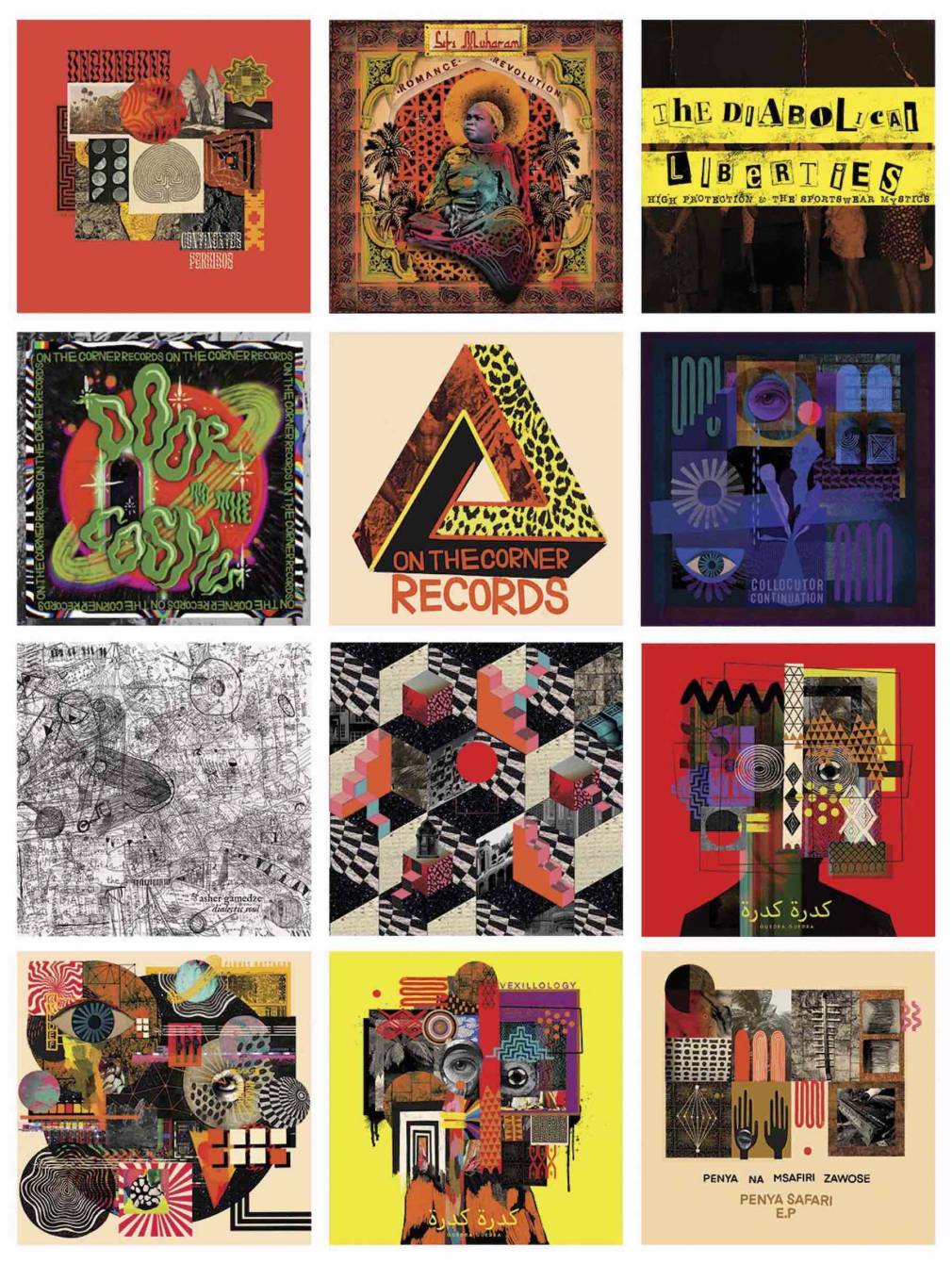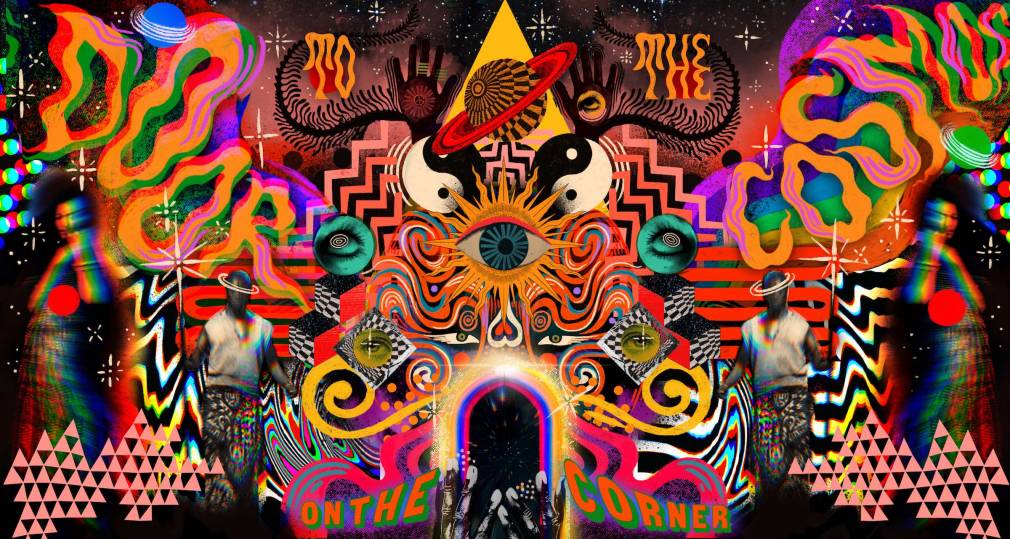Originally conceived as a modest lab for musical experimentation, On The Corner Records has become a powerhouse of musical fusion, reaching its zenith this year. Pete Buckenham, a former case worker for a human rights organisation, liked to combine business with pleasure by seeking out stories and music whilst travelling for work. “I’ve travelled a lot and collected many records over the years“, he recounts, “I wanted somewhere to play a mix of underground electronic music with ethnographic recordings. There was nowhere at the time linking the dots from deep house to spiritual jazz.”
Working in a refugee camp during the week and DJing in a club in Zanzibar at the weekend, Pete eventually decided to take a year out to get in touch with music and experience it up close on the streets, taking enough inspiration from these moments to set up his own parties in central London. With almost zero knowledge of label management, Pete released the first EP of his friend and collaborator Emanative in 2013. That spark lit a flame and Over was the catalyst for an extraordinary adventure that has at its heart an avant-garde mix of cosmic jazz and electronic music.
The ghost of Miles Davis
The name “On the Corner” is of course a reference to that brilliant Miles Davis album of the same name. Davis is an artist who has long kept Pete under his spell. With admiration he admits that he “could talk about this album all day“.
“Miles kind of threw jazz in the face of white middle-aged critics and took it back to the streets. He was seeing how young African Americans were tuned into Sly & the Family Stone or Jimi Hendrix and he realised that the jazz had changed. He innovated jazz several times throughout his career. He wanted to connect to that energy of where the music came from. I found it fascinating, socially.”
With the excesses of anger and addiction behind him, Pete is reviving Miles Davis’ early 70s attitude – the man who preferred to mangle jazz codes rather than remaining chained to them, inviting musicians from all over the world to join in with his games on the trumpet.
“It all comes from Miles Davis’ attitude, the early 70s period of his music when he introduced electronics, and started to explore different rhythmic roots within the music“, continues Pete, “He created a cosmopolitan sound because he brought in musicians with different rhythmic histories. That album represents a really unusual groove – a communication between the musicians, some experimentation, all connecting different musical languages and sources. I’m all about that. There’s no formula for this.“
In search of the unheard
On his web page, Pete soberly describes the concept as “Griot house to modal jazz“, a description that says a lot about the range of styles he encompasses and the unpredictability of his catalogue. Beautiful 2020 releases such as Siti Muharam, Asher Gamedze and Guedra Guedra sound like ideal ambassadors for Pete’s philosophy, as each artist seeks integrity over being fashionable or trendy. The moment he hears hybrid music that he can’t categorise it’s a potential signing for him, such as the bootleg between Larry Levan and Fela Kuti that triggered his career as a DJ.
“I am very interested in the unheard’, he confirms. ‘One of the things I love as a listener is when I’ve got no idea what something is, and then I wanna know about the context and what kind of journey this music had been on. Hearing music I can’t categorise.“
In this regard he compares Siti Muharam’s story as she follows in the footsteps of her grandmother, the mother of the Taraab, Siti Binti Saad, to that of Ali Farka Touré who “understood where the blues came from, and how it started in Africa“.
A true storyteller, Pete not only puts the sounds but also the stories of these artists in the spotlight, be they Peruvian duo Dengue Dengue Dengue’s rhythmic research that has been documented and planned for future release, or the Moroccan Guedra Guedra who reconnects the cultural rites of the Maghreb and sub-Saharan Africa via electronics.
South African drummer Asher Gamedze’s album is further proof of openness and spontaneity. “His music comes from a history of black radical thoughts and culture“, says Pete, “He is an activist, pushing things forward himself. The album came to me as a finished product – my job is to take him to his audience.” Surely equipped with a magic wand, Pete travels the globe searching for artists who know how to innovate and take risks. “I’m kind of providing a space for artists that is not available elsewhere“, he continues, “The music comes from all different parts of the world but that’s not the theme, it’s not only about capturing a global feeling, there’s also an underground of musicians who are innovating, trying to do something out of the ordinary.“
Whether it’s sharing his alternative ideology with those on the other side of the world, meeting people during a DJ set, attracting new artists, or managing the workings of his label – “as a cultural space rather than necessarily a business with a bottom line” – each release is the fruit born of a story, an anecdote, a discussion. “Even if it is a pastiche of different influences, I wanna hear the artists’ own voice, own journeys and own kind of experiments“, he carefully insists “Running a record label as a business is an absolute nightmare. You’re constantly dealing with trying to predict future trends, tastes and also influences. Artists who might have been under-represented or have a sound that might not have been picked up yet definitely interest me!“
No future without Africa
“Africa and black music is vital to On The Corner, as well as to the origins of jazz.” Pete is crystal clear about his influences so it’s hardly surprising that he’s attracted to artists who retrace their roots in music. He is passionate about “tracing the journey of music from Africa and the transportation of peoples in the violence of colonialism, through to oppressive Jim Crow legislation that forced musicians to kind of unite.” Plunging into the past is often what creates the music of tomorrow, much like the Door to the Cosmos compilation that references the Sun Ra album Door of the Cosmos. Describing his label as “Afro-futurist” slightly ruffles the Brit. Pete reminds us that “as much as he was thought of after his death as Afro-futurist, [Sun Ra] pushed the limits of black music“, thereby setting the record straight. “Knocking on the door of the cosmos has the musical meaning of sound exploration, but could also refer to the kind of black experiences on planet Earth where this door represents an escape from one’s trappings and oppression.“
With DJ Khalab’s album Black Noise 2084, Pete wanted to present a potential future in three stages, from the spoken-word of Tenesha The Wordsmith, to the visionary jazz of Moses Boyd and Shabaka Hutchings, through to recordings made in the Congo, all based on Khalab’s style and drawing influences from black music. It is through to this endless ping-ponging between eras and spaces that Pete develops his approach. “The music and the chants of griot, of call and response, can be found in house music“, He explains, “There are some tracks from Theo Parrish which work alongside traditional music from the southern Sahara in Algeria, almost the same kind of trance“. Other than sound quality, Pete is obsessed with the importance of referencing the source, either closely or remotely linked to the African continent or to a subculture of black music such as Chicago house, Detroit techno, or Brighton’s drum’n’bass.
To end on a vision for the future, this is what the world might look like in twenty years, if only it would listen to Pete: “It would be a very different society where the arts and culture would have much more space, there’d be a load of artists innovating and improvising, without needing necessarily to work within the traditional means of labels or pop music. There would be more people interested in this music and in expressing their artistic voice. Not art only for the elite, but for the people, for local musicians, people engaged in the artform of music. You go to an art gallery, some people pay to go and see a particular exhibition, but some people go just to experience a different form of art. If a wider population could have that attitude – that would be my ideal.“
The brilliant compilation Door to the Cosmos is still available here.




